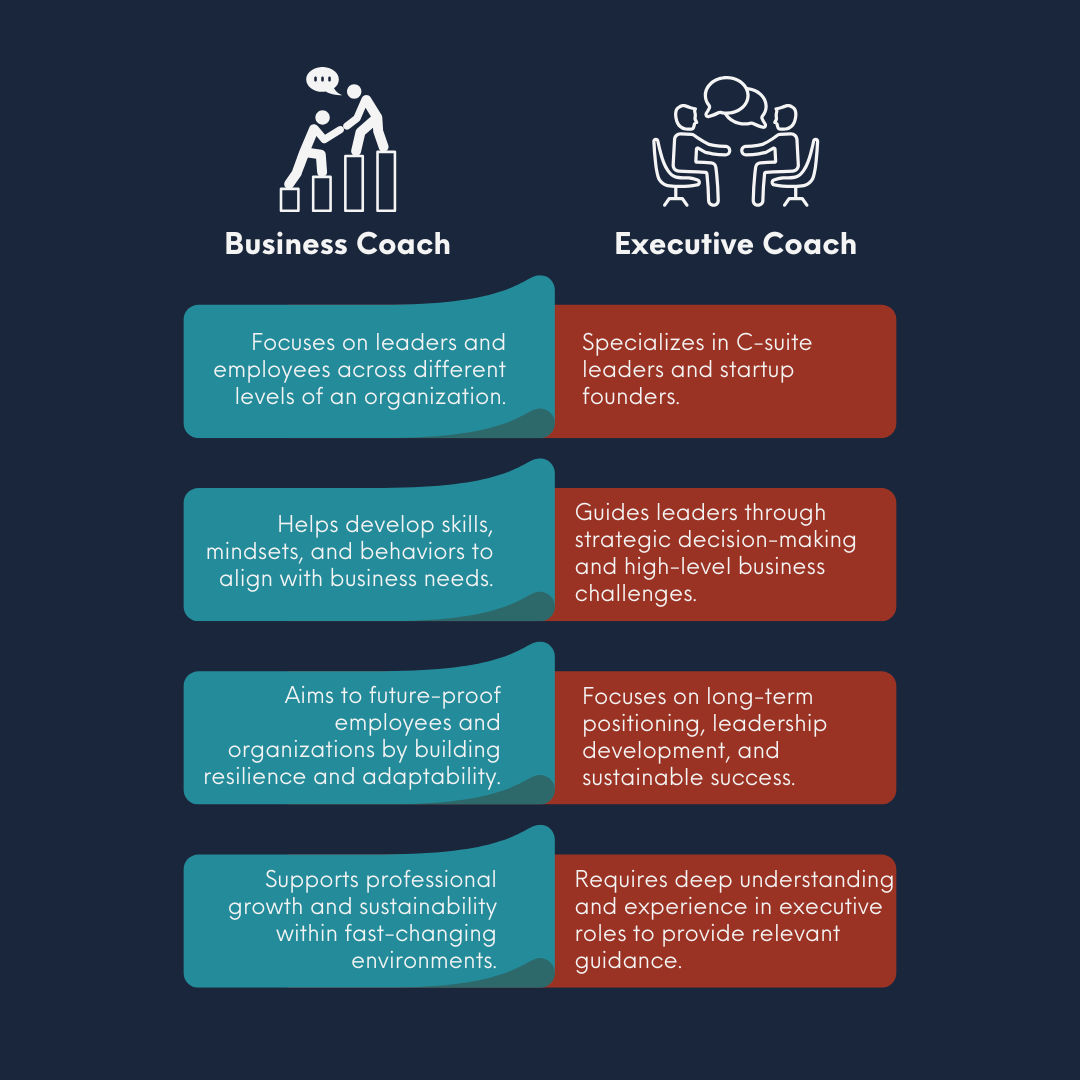What differentiates a Professional Business Coach coaching Managers and Employees and an Executive Coach coaching C-suite level Leaders? Within the coaching sphere, a general consensus has emerged that polarizes the work of a Professional Business coach versus that of an Executive Coach. This theory suggests that a Professional Business Coach focuses on business as a whole, while an executive coach’s work centers around the individual’s personal development.
A more accurate depiction is the following: Both Executive Coaching and Professional Business Coaching focuses on business outcomes. The difference lies in understanding and resonating with the daily lives of Executives and C-suite leaders, as well as having experience with guiding and coaching them on their unique day-to-day challenges.
In this article, I will look at the fundamental differences between a ‘’regular’’ Business Coach and an Executive Coach, and examine existing definitions. I will also delve into the importance of hiring a qualified Executive Coach.

Defining Professional Business Coaching and Executive Coaching: What is the Difference?
To begin, let’s take a closer look at the definitions of both Professional Business Coaching and Executive Coaching. Professional Business Coaching is:
‘’the art of helping leaders and employees grow and thrive as well as drive their business in a desired, more impactful and sustainable direction.” - as defined by Session
The specific aim of professional business coaching is to help leaders and employees develop and grow so that their skill sets, mindsets and behavior matches the needs of their organization. This aim helps future-proof employees and the business and equip employees with the skills to maintain growth (personal as well as organizational) in the face of adversity and fast-paced change.
In line with the above, Executive Coaching can be defined as:
‘’The art of helping C-suite level leaders and startup founders grow and strategically position their companies, as well as strengthening top executives to make wise and sustainable decisions to the benefit of themselves as well as their companies.’’ - as also defined by Session
The specific aim of Executive Coaching, then, is to help C-suite leaders accomplish business challenges unique to c-suite and start-up founder roles at the same time as they take care of their own well-being.
As the business challenges differ significantly to those faced by managers and employees at other levels of the organization, it is crucial that the Executive Coach can relate to, empathize with and understand these challenges on a deep level. This only happens through either having possessed such a role oneself, or by having educated oneself to understand what is happening and going on in the daily life of a C-suite level leader. On top of this, having worked with C-suite level executives for many years is paramount to get the full qualification of being a skilled and knowledgeable Executive Coach.
To further understand what the difference between Executive Coaching and “regular” professional coaching is, let us take a look at a day in the life of an Executive as well as a day in the life of a Manager.
A Day in the Life of a C-Suite Executive Versus a Manager
Let’s delve into the everyday responsibilities and duties that differentiate the roles of a C-suite Executive and a General Manager.
Firstly, we will take a look at the day in the life of a c-suite executive:
Calvin is the CEO of a sports apparel company based out of Canada. He starts his day meeting with his international team through a video conference call. Once in the office, Calvin meets with his executive assistant to go over his daily agenda, followed by participating in a team ‘’huddle’’ with his immediate leadership team, to go through the latest updates on a re-org which is to be communicated to the whole organization later today. He then meets with the communications team to discuss the latest press-release, and carves out time to talk to a number of journalists.
Calvin has lunch with potential new leaders within the organization, talking to them about their career growth trajectory and new internal leadership opportunities. In the afternoon, Calvin communicates with the whole organization via a hybrid meeting: some team members are present in-office while other team members dial in for the information meeting regarding the latest re-org. Calvin answers questions about the reasons behind the re-org and listens to his team’s immediate reactions and feedback. Later, Calvin goes over some updates on the financial numbers with his CFO, before he leaves the office to join an informal dinner with a network of potential collaborators.
As shown in the example above, it is clear that a C-level executive, such as Calvin, is engaged in a number of high-level processes. Strong business acumen, necessary for life in the c-suite, is clearly demonstrated throughout his day: from providing leadership for both his in-office and international teams, to engaging in strategic development, to undertaking company-wide organizational planning, looking at trends in the market and staying ahead of things by meeting with potential partners and collaborators.
Next, let’s take a look at the day in the life of a manager:
Jennifer is the Marketing Manager of a mid-sized non-profit organization based out of the UK. Her day starts with a morning check-in with her team, consisting of a marketing intern, coordinator, and specialist. She checks in with her team on the progress of their weekly tasks, and provides recommendations and feedback on their existing work. After, she carves out a one-hour time slot to reply to email and queries from internal staff and external stakeholders. In the afternoon, Jennifer has a one-to-one meeting with the organization’s CEO to discuss the Q4 marketing budget. She provides updates on the ROI of current marketing spend, and advises the CEO on recommendations for the remainder of the marketing budget. In the afternoon, Jennifer spends two hours planning out the organization’s communication strategy. After, she meets with an external vendor who is working on the organization’s website design and provides recommendations on the project. Before finishing her day at the office, Jennifer checks in with her marketing team to ensure progress has been made on their daily tasks and guide the team if there are any outstanding questions to be answered.
As demonstrated in the example above, it is clear that Jennifer’s workday differs significantly from Calvin's. Jennifer demonstrates clear leadership responsibilities: supporting and supervising team members, making budgeting recommendations and overseeing external vendors, but her work differs vastly from that of Calvin’s work. While Jennifer deals with the day-to-day responsibilities of her department, Calvin deals with whole organizational structures, long-term strategic planning, and provides leadership support for company-wide departments.
C-Suite Level Executives Versus Managerial Executives: What is the Difference in Roles?
What, then, differentiates a C-suite executive from a VP, director, or manager?
Groysberg defines the following skills as crucial factors for C-suite success:
- visionary leadership
- strategic thinking and execution
- technical and technology skills team
- relationship-building,
- communication and presentation
- change management
Possessing these skills, and executing them on a daily basis, requires a level of experience and business acumen that differs from managers and employees at other levels of the organization. Moreover, c-suite executives are also expected to have extensive and varied experience in a number of domains: a solid leadership experience that encompasses leadership and managerial roles, quantifiable data to prove above-par performance, and the ability to not only set the strategic direction for the organization but also ensuring it gets implemented.
As Groysberg, Kelly, & MacDonald discuss, once people reach the C-suite, technical and functional expertise matters less than leadership skills and a strong grasp of business fundamentals, a nose for “what's next” and a visionary ability to carve out a potential, better future.
‘’Chief information officers need to know how to create business models; chief financial officers, how to develop risk management strategies; chief human resource officers, how to design a succession plan and a talent structure that will provide a competitive edge.’’ - Groysberg, Kelly, & MacDonald
In other words, the skills the individual has learned in managerial positions, won’t suffice once he or she has reached C-suite level status. Additionally, once individuals make the transition to executive positions, they require more support than ever, as these positions can be isolating:
“Many business heads also feel that they’re “going it alone” - they’re receiving much less guidance from their boss than they did when they were functional managers.” - Ram Charan, The Leadership Pipeline: How to Build the Leadership Powered Company
Therefore, getting an Executive Coach can be exactly what makes the difference between C-suite level leaders succeeding or not in their position. In business, leadership at every level is a requisite for company survival. Yet the leadership pipeline –the internal strategy to grow leaders – in many companies is dry or nonexistent. Drawing on the author’s experiences at many Fortune 500 companies, The Leadership Pipeline: How to Build the Leadership Powered Company shows how organizations can develop leadership at every level by identifying future leaders, assessing their corporate confidence, planning their development, and measuring their results.
Hiring the ‘’Right’’ Executive Coach: What C-Suite Leaders Need to Know
After examining the different roles of C-suite Executives and Managers/employees, let’s now examine the need to hire the ‘’right’’ Executive Coach. As Berglas emphasizes, a significant danger lies in the world of Executive Coaching, in which:
‘’Many executive coaches, especially those who draw their inspiration from sports, sell themselves as purveyors of simple answers and quick results.’’
This ‘’quick-fix’’ mentally stems from business wanting high-performing resultsin the most painless, and easiest of ways. As Berglas continues to explain, to achieve fast results, many popular executive coaches model their interventions after those used by sports coaches, employing techniques that reject sustainable and introspective processes, and instead focus on ‘’quick’’, but ultimately ineffective performance improvements which will not serve the individual in the long-term.
How does one avoid this ‘’quick-fix’’ mentally that exists in the coaching sphere? What exact expertise makes for an effective and competent executive coach? Factors that make for an effective executive coach include the following:
- An executive coach needs to have a sound coaching philosophy; he or she needs to provide highly customized and confidential counsel, guidance and support for the client.
- An executive coach has to design a coaching methodology and process; the coach needs to thoroughly understand coaching philosophies before defining his/her philosophy, undertake recognized coaching certification programs, and decide on the best methodology based on client needs.
- An executive coach should commit to lifelong learning: as well as specific education, certification and experiences, and should remain dedicated to life-long learning to keep-up with evolving trends that best support the C-suite executive’s coaching needs.
Some other important coaching qualities include the following:
- Attentive listening skills – they hear what you do and don’t say.
- Empathy and high-level emotional intelligence – they can read emotive indicators and body language even virtually.
- Asks deep, evocative, relevant questions.
- Opens your mind to new possibilities and perspectives.
- Helps you identify, understand, appreciate, and apply your own as well as the strengths of others and how these can compensate for your weaknesses.
- Supports and motivates you (when you need it) and brings you back to reality if your self-confidence becomes overinflated.
- Holds you accountable - to promises, values, and strengths as well as limitations.
- Maintains the balance between challenging, supporting, provoking, and motivating you.
- Keeps appointments.
- Keeps things confidential - and thus are trustworthy.
- Structures and explains the coaching process for you.
The attentive reader could argue that these qualities also account for the Professional Business Coach, coaching managers and employees. And we agree. The core difference lies in understanding at a deep level what a day in the life of a C-suite level leader is like. Only when this is understood by the Executive Coach, s/he can genuinely coach, support, guide, advise, nudge and ask the right questions to the Executive Leader.
Conclusion
I hope you have enjoyed learning about the differences between an Executive Coach and a Business Coach. Executive Coaches are required to empathize and deeply understand the life of c-suite level executives. On top of this, Executive Coaches require the skills, education, and years of experience needed to coach C-suite executives.
If you are looking for coaching advice, please reach out and we will guide you toward a tailor-made coaching program that fits exactly with your needs!












